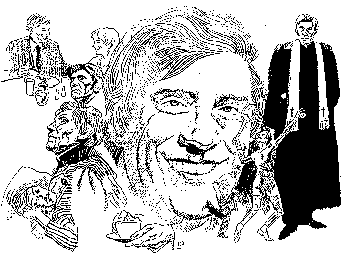|
The Body and Christian Theology
In his letters to the Corinthian church the apostle Paul tried to correct a type of super-spirituality which depreciated the human body. He contended that the body was God's temple which would be resurrected at the last day (1 Cor. 3:16,17; 6:18,19; 2 Cor. 6:16; 1 Cor. 15).
The early apologists for the Christian faith had to contend against the same Grecian influence by stoutly maintaining three fundamental things — that God created a material universe including the human body, that the incarnation was a bodily reality, and that there will be a resurrection of the body at the last day. This is how it came about that these three Christian affirmations figured so prominently in the Apostles' Creed.
 Many of the early church Fathers were educated in Greek philosophy or came under its influence. The result was an amalgamation of Christian theology with Greek philosophy. Many of the early church Fathers were educated in Greek philosophy or came under its influence. The result was an amalgamation of Christian theology with Greek philosophy.
The theology of the early Middle Ages was dominated by the towering figure of Augustine of Hippo, who completed the fusion of the Pauline emphasis of sin and grace through faith with a Neoplatonic view of man that stressed the imprisonment of the soul in the body. This dualism led to an increasing asceticism in the life of the medieval church, which meant an attitude of indifference or even outright hostility toward the body. The official theology of the church concentrated on getting the soul of the believer into heaven, through the Sacraments, or at least on saving it from hell, as the doctrine of purgatory developed. —James N. Lapsley, Salvation and Health, p.39.
Coming down to the medieval period, Lapsley continues:
If the health of the body was not forgotten, it was once again generally relegated to the status of a matter of relative indifference, which might as well be sacrificed to gain eternal bliss. This was the situation that obtained as Martin Luther grew toward manhood at the turn of the sixteenth century. —Ibid., p.41.
The medieval church did not understand what the New Testament meant by "flesh" and "spirit." In real Greek fashion she understood these terms to designate two parts of man — the higher and lower natures. Since things like body, work, eating and sexuality belonged to the "flesh," they were regarded as inferior functions, if not tainted with evil. On the other hand, prayers, fasting, celibacy and religious tasks were regarded as "spiritual" and therefore superior, if not meritorious.
 Luther exploded this whole pietistic framework by returning to a more biblical view of man. He understood that "flesh" and "spirit" were not two parts of man but the whole man seen from two different aspects. All that man did in his natural state was "flesh," especially such "higher" things like praying, fasting, celibacy and religious devotions. And all that which man did under the control of the Spirit was "spiritual" even though it was corporeal activity such as working, eating, and performing family duties. Luther exploded this whole pietistic framework by returning to a more biblical view of man. He understood that "flesh" and "spirit" were not two parts of man but the whole man seen from two different aspects. All that man did in his natural state was "flesh," especially such "higher" things like praying, fasting, celibacy and religious devotions. And all that which man did under the control of the Spirit was "spiritual" even though it was corporeal activity such as working, eating, and performing family duties.
Subsequent Protestant theology, however, tended to make as great a dichotomy between salvation and body as the church did before the Reformation. Its overriding concern was to save the soul and get it into heaven. The Bible also talks about saving souls, but by this it means saving whole persons, not a part of the totus homo.
Results of Super-spirituality
An unbiblical super-spirituality which depreciates the body can be a real handicap in the church's task of reaching those outside her fold. The man in the street often feels that the church's concern is not for his concrete corporeal existence. He thinks that Christians are preoccupied with the flight of the soul from the material world, and he feels that Christian theology is too unrelated to real life. Where did cartoonists get the idea of depicting heaven as a ghost sitting on a cloud, strumming a harp? How can a real man, who is a lover of his own flesh (Eph. 5:29)—which in itself is not sinful but is man's God-given nature — and who is a lover of the material world, find anything really winsome in a "salvation" like that? He is often "turned off" by this talk about "salvation" of the soul as if such "salvation" meant some form of incorporeal existence which he cannot possibly appreciate—in fact, an existence which he must, as man, find quite repugnant (see 2 Cor. 5:3, 4).
The problem is that the word salvation has become so truncated through the influence of Christian philosophy on Christian theology that the word seldom means to modern ears what it meant in Bible times. It has come to mean (or at least sounds like) salvation of a part of man. It is true that the resurrection of the body is still confessed, but it is tacked onto salvation almost like an eschatological afterthought.
A distorted anthropology distorts the healthy, down-to-earth realism of God's loving concern for the whole man. It tends to the notion that God does not care, or at least cares very little, for the body or the whole man as a totality. It is a dehumanizing view of man which fails to do justice to the biblical truth that it is the whole man whom God loves — man who in the totality of his existence eats and sleeps, works and plays, laughs and weeps; man who loves to see the light of the sun and dreads the darkness of the grave.
 When the church presents anything less than a message of salvation of the whole man, when she fails in her mission to speak to the whole man, she abdicates vital territory which is then completely taken over by secular philosophies. Then she has to compete with false messiahs with one hand tied behind her back. But the church should be the bearer of the good news of the redemption and restoration of the total man. When the church presents anything less than a message of salvation of the whole man, when she fails in her mission to speak to the whole man, she abdicates vital territory which is then completely taken over by secular philosophies. Then she has to compete with false messiahs with one hand tied behind her back. But the church should be the bearer of the good news of the redemption and restoration of the total man.
A super-spirituality which depreciates the body also has a detrimental effect on believers within the church. If they think that salvation has little to do with man's corporeal existence but consists rather in a flight from that existence, this will distort their view of what it means to live the Christian life. Some will tend to think that the essence of holiness consists in ascetic withdrawal from all the joys of concrete bodily existence. A sharp distinction is then made between doing "secular work" and "the Lord's work." Heaven seems near only in devotional exercises or when the emotions are stirred in religious meetings. Spiritual euphoria is thought to be the atmosphere of heaven.
Or a concept of "soul-salvation" which is not a "whole-salvation" can lead people to think that since God is not very concerned with the body, neither should they be too concerned about how they treat the body. It is amazing how many Christians think that they display their spirituality by neglecting the body. If they hasten a coronary by bad living habits, they think that this will be a good testimony of their dedication to the Lord's work.
While no evangelical Christian today would espouse the heresy that immoral acts are not a hindrance to holiness, still the Grecian view of the human body is difficult to shake off. Many of us still treat the body with shameful indifference. We make little effort to preserve our powers in the best possible condition. We invite great bodily debility by the indulgence of appetite and hurtful habits, and think that God is not concerned with how we regard the laws of life. By intemperance our powers of body and mind are greatly impaired, yet we think this has little or nothing to do with progress in the divine life. But so-called harmless indulgences of the flesh can enslave us and prove to be the greatest hindrance to soul sanctification. We need to distinguish between this spurious "Grecian sanctification" and the New Testament sanctification of the whole man.
This type of emphasis which concentrates on an immaterial soul salvation has brought a reaction — a radical swing by one section of the church toward the "social gospel" and a message of salvation which concentrates on improving man's lot in this world. Either view — the salvation of the metaphysical "soul-box" to the exclusion of the body, or the salvation of the body without personal regeneration of the heart and the creation of a hope of the life hereafter — is a distortion of the biblical idea of salvation of the whole person, whom God wills to live in the totality of his existence in the enjoyment of all God's gifts in fellowship with God.
The Interrelation of the Physical, Mental and Spiritual Natures
Man has physical, mental and spiritual powers, which are closely related and integrated into one living person. Instead of man being like this:

he is more like this:

This means that whatever affects one part of man will affect the whole man. We cannot be truly healthy in one area of our existence unless we are healthy in every area. A sick body tends to depress the mind and the human spirit. Guilt can cause all sorts of physical disorders, while a merry heart does good like a medicine.
There are many people in this world who are looking for real health and quality of life. Surely the church has a message for them. She can tell them that they cannot find optimum well-being and quality of life while they ignore their spiritual health. Their life of estrangement from God, their hostility to Him, and their burden of guilt affect their mental and physical health. But what if they reply (as they might) that our neglect of the physical laws of life also prevents us from attaining optimum spiritual health?
Of course, this principle of the vital interrelation of our threefold nature means that while we are in this world we cannot realize perfect physical, mental or spiritual health. We cannot be perfect in one area unless we are perfect in every area. But we do have a completeness already by faith in Jesus Christ (Col. 2:10). In Him we are already restored and glorified at God's right hand (justification), and we wait for this perfect life to appear with Him (glorification) (Col. 3:2-4). In the meantime, however, it is our privilege and responsibility to glorify God by living in harmony with all the laws of our physical, mental and spiritual natures (sanctification). One thing is sure: we will inevitably begin to practice in the here and now what we hope to be in the there and then.
|
 Many of the early church Fathers were educated in Greek philosophy or came under its influence. The result was an amalgamation of Christian theology with Greek philosophy.
Many of the early church Fathers were educated in Greek philosophy or came under its influence. The result was an amalgamation of Christian theology with Greek philosophy. Luther exploded this whole pietistic framework by returning to a more biblical view of man. He understood that "flesh" and "spirit" were not two parts of man but the whole man seen from two different aspects. All that man did in his natural state was "flesh," especially such "higher" things like praying, fasting, celibacy and religious devotions. And all that which man did under the control of the Spirit was "spiritual" even though it was corporeal activity such as working, eating, and performing family duties.
Luther exploded this whole pietistic framework by returning to a more biblical view of man. He understood that "flesh" and "spirit" were not two parts of man but the whole man seen from two different aspects. All that man did in his natural state was "flesh," especially such "higher" things like praying, fasting, celibacy and religious devotions. And all that which man did under the control of the Spirit was "spiritual" even though it was corporeal activity such as working, eating, and performing family duties. When the church presents anything less than a message of salvation of the whole man, when she fails in her mission to speak to the whole man, she abdicates vital territory which is then completely taken over by secular philosophies. Then she has to compete with false messiahs with one hand tied behind her back. But the church should be the bearer of the good news of the redemption and restoration of the total man.
When the church presents anything less than a message of salvation of the whole man, when she fails in her mission to speak to the whole man, she abdicates vital territory which is then completely taken over by secular philosophies. Then she has to compete with false messiahs with one hand tied behind her back. But the church should be the bearer of the good news of the redemption and restoration of the total man.